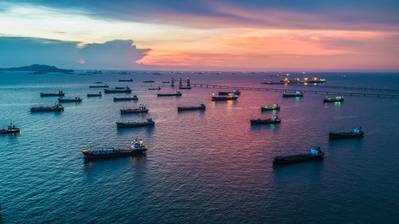WSC Proposes Green Balance Mechanism
As the IMO prepares for negotiations on regulations to support net-zero by 2050 at MEPC 81 in March, the World Shipping Council (WSC) has proposed a greenhouse gas pricing mechanism it calls the Green Balance Mechanism.
The aim is to provide a new approach to greenhouse gas pricing which makes it possible to close the price gap between fossil fuels and green fuels, at the lowest possible overall cost:
• Through the Green Balance Mechanism, fees are taken from fossil fuels and allocated to green fuels used, so that the average cost of fuel is equal.
• The greater the greenhouse gas emission reductions a fuel delivers – on a well-to-wake lifecycle basis – the greater the financial allocation received.
• The monies collected in any given year is determined by the amount of green fuels used, allowing for a relatively low fee at the start of the transition.
• The minimum fee necessary to offset the price differential in a given year is collected and allocated to ships using green fuels that meet a specific greenhouse gas threshold. This ensures that green fuels can be produced and used and does so with the least possible cost to transportation.
• The emission reductions required for a fuel to receive a price-balancing allocation are linked to IMO decarbonisation requirements, increasing in stringency toward the 2050 net-zero goal.
• The Green Balance Mechanism is adaptable and fully integrated with a greenhouse gas fuel-intensity standard. It can be used as a targeted greenhouse gas pricing mechanism, or a possible addition to an integrated measure.
• Other fees can be added to raise funds for climate mitigation initiatives and research, development and demonstration projects, to provide a just and equitable transition.
The Green Balance Mechanism makes it economically rational and attractive for both ship owners and energy providers to invest in fuels and technologies that deliver deep greenhouse gas reductions from the day the regulation takes effect, says the WSC. Existing and soon-to-be delivered dual-fuel ships will be able to operate on the cleanest fuels, rather than having to wait years before economically viable fuels are available. This allows production of the cleanest fuels to grow more quickly, accelerating economies of scale that will push down the cost of green fuels, getting us to zero in the most economically efficient way possible.
"The World Shipping Council's proposal for the Green Balance Mechanism is a pragmatic step towards sustainable shipping. This greenhouse gas pricing mechanism aims to promote a competitive shift to low-emission fuels, which is consistent with our sustainability measures, our goal to operate a net-zero fleet by 2045, and the shipping industry’s overall commitment to decarbonisation. Additionally, it promotes the production of alternative fuels and minimises the economic burden on all stakeholders, ensuring a level playing field. These are crucial factors for a successful energy transition in maritime shipping,” says Rolf Habben Jansen, CEO of Hapag-Lloyd.
“The year 2050 might seem distant, yet in the context of our climate ambitions, it is practically upon us. The IMO is at a crossroad that will determine our ability to decarbonise the shipping industry and achieve net-zero emissions. To get there, we need mechanisms that can bridge the transition from fossil-based to green fuel, and we call on IMO Member States to take decisive actions that reward early adapters by compensating truly green vessels corresponding to their emission's reductions. This approach is critical for accelerating the retirement of fossil-fuelled vessels,” says Vincent Clerc, CEO of Maersk.
“NYK Line recognizes the urgent need to transition toward a decarbonized society and mitigate the effects of climate change. As a responsible shipping company, we are committed to playing a vital role in this global effort and are determined to lead the way toward a sustainable and low-carbon future. Our commitment and strategies are reflected in the NYK Group Decarbonization Story we released last year. We will actively invest in and adopt innovative technologies that reduce greenhouse gas. At the same time, we do hope the IMO plays a leading role in introducing effective mechanisms to accelerate investments in zero or near-zero emission ships,” says Takaya Soga, President & CEO, Representative Director, Group CEO of NYK Line.
















